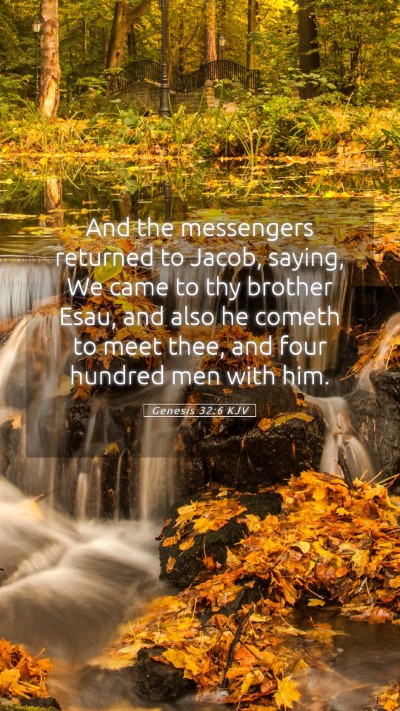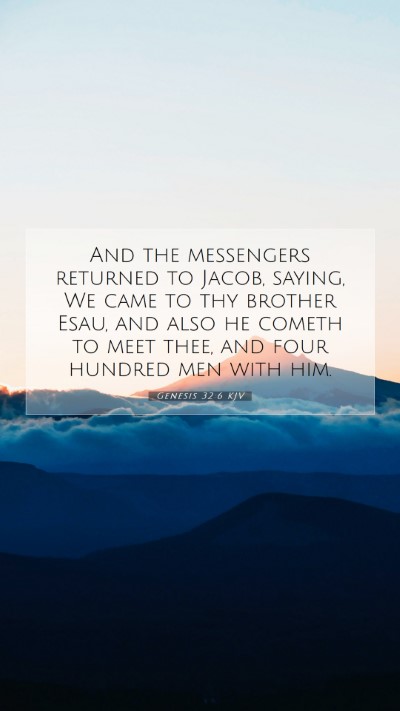Understanding Genesis 32:6
Genesis 32:6 reads, "And the messengers returned to Jacob, saying, We came to thy brother Esau, and also he cometh to meet thee, and four hundred men with him." This verse comes at a crucial moment in the narrative of Jacob, highlighting significant themes such as fear, reconciliation, and divine intervention.
Overview of the Verse
This verse marks Jacob's fearful anticipation of meeting his estranged brother, Esau. Having fled years earlier due to conflict over their father's blessing, Jacob is now confronted with the potential for reconciliation, yet he is apprehensive, as Esau approaches with a contingent of 400 men. The verse sets up the dramatic tension and themes of family dynamics and personal transformation.
Bible Verse Meanings
- Fear of Confrontation: Jacob's anxiety about Esau symbolizes the internal struggles many face when confronting past mistakes.
- Hope for Reconciliation: The approach of Esau can also be viewed as a moment of hope—a chance for healing familial wounds.
- Divine Providence: The larger narrative assures readers that God is watching over Jacob, guiding the events leading to this meeting.
Bible Verse Interpretations
According to Matthew Henry, this encounter reveals Jacob's character transformation from a deceiver to a more humble and repentant individual. Adam Clarke emphasizes the significance of the number of men Esau brings, suggesting it indicates Esau's might, which intensifies Jacob’s fear. Albert Barnes asserts that this meeting foreshadows the ultimate reconciliation of the family, viewing it through the lens of grace and forgiveness.
Scripture Analysis
This moment can be seen as a pivotal point in Jacob's journey. The fear experienced is relatable; it reflects a common human experience when dealing with strained relationships. Jacob's initial reaction of fear can teach us about our own responses to conflict and how we prepare for the possibility of reconciliation.
Historical Context of Genesis 32:6
Understanding this verse requires looking at the historical relationship between Jacob and Esau. Decades before, Jacob had taken advantage of Esau, acquiring his birthright and blessing. This context heightens the tension of their reunion, emphasizing themes of repentance and the impact of sin on relationships.
Significance of the Encounter
The significance of Esau coming with 400 men can be interpreted in a few ways:
- Military Might: Esau's approach could indicate he is coming with an intention of war or confrontation.
- Support for Reconciliation: Alternatively, the men could be seen as a show of familial support, ready to back Esau in achieving peace.
Application of Genesis 32:6 to Daily Life
This verse prompts readers to reflect on their relationships and how unresolved conflicts can weigh heavily on one's conscience. It teaches lessons on humility, the importance of addressing past wrongs, and seeking reconciliation with loved ones.
Bible Study Insights
For individuals engaged in Bible study groups, the themes of Genesis 32:6—fear, reconciliation, and divine intervention—can provide rich topics for discussion. Tools like commentaries, historical insights, and personal reflections can enhance understanding and facilitate practical applications in everyday life.
Related Bible Cross References
- Genesis 27:41-46: The backstory of Jacob and Esau's conflict.
- Genesis 33:1-4: The actual meeting and reconciliation between Jacob and Esau.
- Romans 12:18: Encouragement to live at peace with everyone, relevant to Jacob's situation.
Conclusion
The exploration of Genesis 32:6 through various lenses—historical, theological, and personal—provides a profound understanding of the nature of conflict and reconciliation. This engagement can serve not only as an interpretation but also as encouragement to approach our own difficult relationships with hope and humility.


